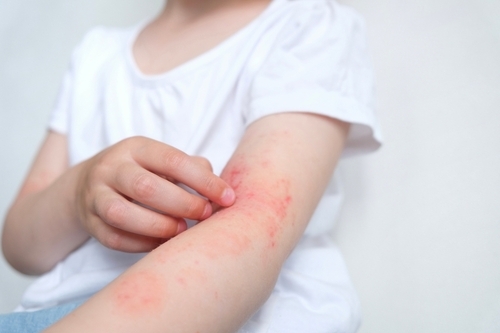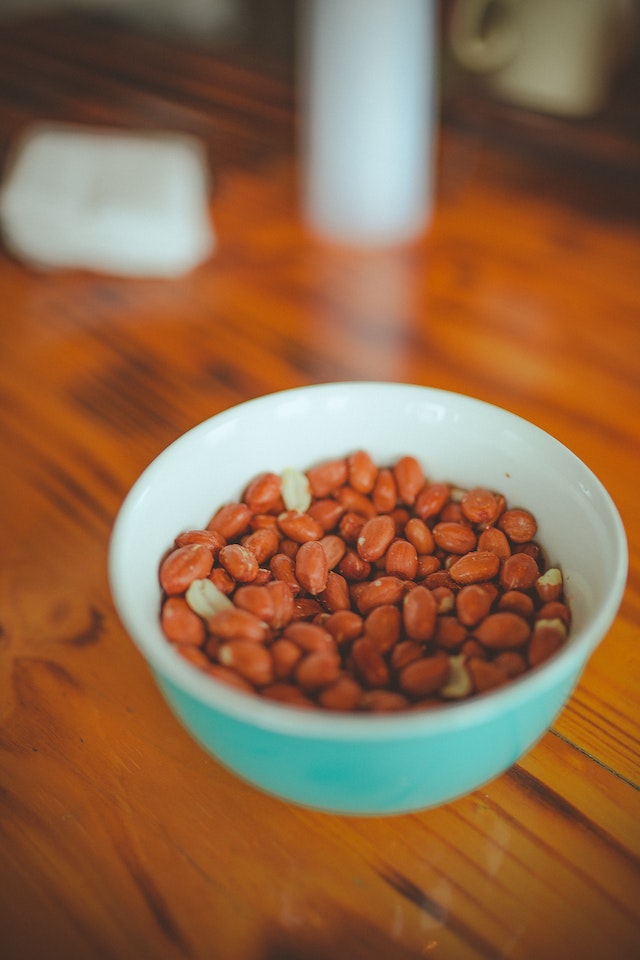From pinkvilla.com
There is no one-shot eczema diet that may work for everyone. It is a journey of discovering the foods that might trigger flare-ups for you and how to prevent them
Eczema, a common chronic skin condition, causes discomfort and irritation and often impacts a person's quality of life. While there is no definitive cure for eczema, emerging evidence suggests that adopting an eczema-focused diet can play a pivotal role in managing symptoms and promoting skin health. Discover the transformative potential of an eczema diet as it nourishes the itchy skin and offers relief from symptoms.
The connection between diet and eczema has gained significant attention in recent years as researchers uncover the profound influence of nutrition on various bodily processes, including immune function and inflammation. Over time, it has become evident that certain dietary choices can either aggravate or alleviate eczema symptoms, offering new directions to control atopic dermatitis apart from medical treatments.
In this article, we will explore the fundamental principles underlying an eczema-friendly diet, examine the scientific rationale behind its effectiveness, and provide practical dietary guidelines to empower individuals to make informed choices for healthier skin.
As we navigate this informative journey, it is important to remember that dietary modifications should always be pursued with professional medical advice. Understanding the intricate relationship between what we eat and how it affects our skin can unlock a powerful tool for managing eczema and nurturing skin health from within.
What Is Eczema?
Eczema, scientifically known as atopic dermatitis, is an inflammatory condition that is known to affect people of different ages. With its typical characteristic of causing itchy and inflamed skin patches, it also accompanies blisters, dryness, and scaling. It is most commonly found on the face, hands, elbows, and behind the knees.
The causes of eczema are not yet fully understood, but genetics and environmental factors play a major role in the aggravation of the chronic disease. People with eczema often have a compromised skin barrier, which allows irritants and allergens to penetrate the skin more easily. This triggers an immune response, leading to inflammation and the characteristic symptoms of eczema.
The condition is usually accompanied by severe itching, which causes people to scratch the affected areas. Scratching, on the other hand, aggravates the symptoms by making the skin more inflamed, thickened, and susceptible to infection.
While there is no cure for eczema, various treatment approaches aim to manage the symptoms and improve skin health. These include moisturizing the skin, avoiding triggers such as certain fabrics or chemicals, and using topical corticosteroids or immunomodulators to reduce inflammation. In severe cases, medications may be prescribed.
In recent years, there have been several types of research looking into the role of diet in managing eczema. While specific dietary triggers may vary among individuals, certain foods have been linked to eczema flare-ups, such as dairy products, eggs, nuts, and gluten. Consequently, adopting an eczema diet that focuses on anti-inflammatory and nutrient-rich foods may help alleviate symptoms and support skin health.
What Are the Different Types of Eczema?

To ensure proper treatment, it is more important to classify the type of dermatitis. Here are the most common types of dermatitis found in people across the world.
1. Atopic Dermatitis
The most common type of eczema is atopic dermatitis. It is known to occur in individuals with a family history of asthma or a severe allergy to food. Healthcare professionals prefer it to be known as an atopic triad, meaning three. It accompanies hay fever and asthma in patients with atopic dermatitis.
The red rashes may appear over the elbow and knee creases or may appear as small bumps filled with fluid. Dry skin, genetics, a weaker immune system, and a colder environment may trigger atopic dermatitis.
2. Contact Dermatitis
Contact dermatitis has two types. Firstly, irritant contact dermatitis occurs when the skin comes into direct contact with an irritating agent such as detergents, particular fragrances, soaps, or chemicals. While allergic contact dermatitis, on the other hand, arises from an allergic reaction to specific substances such as certain metals, cosmetics, or plants like poison ivy, it shows typical symptoms of red, itchy, bumpy skin that may also look pink or magenta in colour, which over time gives a thick, scaly, or leathery look to the skin.
3. Nummular Eczema
Coin-shaped or oval areas of inflamed skin that may be itchy and painful are the hallmarks of this kind of eczema. Although there is no recognized reason for nummular dermatitis, it is frequently brought on by dry skin, irritants, or skin trauma. It can be difficult to control and seems to happen more frequently in the winter.
4. Dyshidrotic Eczema
Small, irritating blisters develop on the palms, sides of the fingers, and soles of the feet as a result of dyshidrotic eczema, which mostly affects the hands and feet. Dyshidrotic eczema is often linked to elements like stress, allergies, or exposure to certain metals. The blisters may hurt, and they can cause the skin to peel, split, and become dry.
5. Seborrheic Dermatitis
Seborrheic dermatitis primarily affects the scalp, causing dandruff-like flakes, redness, and itching. It can also occur in other oily areas of the body, such as the face, ears, chest, and groin. Seborrheic dermatitis is associated with an overgrowth of yeast on the skin and may be influenced by factors such as hormones, stress, or certain medical conditions.
6. Stasis Dermatitis
This type of eczema typically affects individuals with poor blood circulation, usually occurring in the lower legs. Stasis dermatitis results from fluid build-up (edema) in the legs, leading to swelling, redness, itching, and skin discoloration. It is also commonly seen in individuals with varicose veins or a history of leg vein problems.
How to Get Rid of Eczema?

Eczema is a chronic condition that currently has no known cure. However, with proper care and treatment, it is possible to control the symptoms, which may help you live a better quality of life.
1. Topical Treatments
Moisturizers can be used to hydrate the skin and manage itching and inflammation. This includes emollients (moisturizers), corticosteroids, and topical calcineurin inhibitors (TCIs) that help manage inflammation.
2. Antihistamines
Oral antihistamines can help alleviate itching and improve sleep quality, especially during flare-ups. They are particularly useful for individuals who experience severe itching at night.
3. Wet Wrap Therapy
This technique involves applying moisturizer or medication to the affected areas and then covering them with wet bandages or garments to enhance hydration, reduce inflammation, and provide relief.
4. Avoid Triggers
Identifying and avoiding triggers that exacerbate eczema symptoms is crucial. These triggers can include certain fabrics, harsh soaps or detergents, environmental allergens, stress, and certain foods. Keeping a journal and working with a healthcare professional can help identify individual triggers.
5. Systemic Medications
In severe cases, when other treatments have not been effective, systemic medications such as oral corticosteroids, immunosuppressants, or biologics may be prescribed. These medications may have potential side effects and are typically used for short periods under close medical supervision.
6. Lifestyle And Skincare Practices
This is one of the main factors to take care of while suffering from atopic eczema. Maintaining good skin care habits, avoiding scratching the infected area, and applying moisturizer generously are the keys to a healthy skin routine.
Additionally, managing stress levels, practicing stress-reducing techniques, and wearing soft, breathable clothing can contribute to symptom improvement.
While eczema cannot be completely eradicated, people can achieve significant control over their symptoms and enjoy long periods of remission. Working closely with healthcare professionals like dermatologists and allergists to develop an individualized treatment plan that addresses specific triggers and needs is critical.
Best Eczema Diet Tips And Plan to Try
Certainly! There are different types of diets that individuals with eczema may consider incorporating into their lifestyle. Just like not one size fits all, it is of no surety that this diet may help you control your symptoms. However, you may try and test first before going full-fledged. A diet for eczema includes plenty of fruits, vegetables, and probiotics. Keep reading to know more about ways to cure eczema with diet.
1. Mediterranean Diet

The Mediterranean Diet is all about fruits, vegetables, whole grains, legumes, nuts, seeds, and healthy fats like olive oil. It also includes moderate consumption of fish, poultry, and dairy products while limiting the consumption of meat and processed foods. The purpose of this diet is to include omega-3 and quercetin in the diet; both are known to reduce inflammation and promote skin health.
2. Gluten-free Diet
People allergic to gluten may find this type of diet beneficial. Gluten is a protein found in wheat, barley, rye, and many other grains. In some cases, eczema may be amplified by a gluten allergy. Eliminating gluten-containing foods can be an option to try when suffering from a severe gluten allergy and eczema as well.
3. Elimination Diet
An elimination diet is an approach to identifying potential food triggers, gradually eliminating them from your diet, and reintroducing them one by one. This process helps pinpoint any specific food allergies or sensitivities that might be causing eczema flare-ups. According to a recent review of research, it was discovered that the diet could potentially result in a mild reduction in the severity of eczema in certain individuals. However, further studies are required to obtain more conclusive evidence.
4. Anti-Inflammatory Diet

The anti-inflammatory diet aims to minimize inflammation within the body, offering potential benefits for individuals seeking to manage eczema symptoms. The dietary approach for this type of diet typically involves antioxidant-rich foods such as fruits, veggies, whole grains, fatty fish, and healthy fats such as olive oil. The purpose is to reduce the inflammation caused by eczema, which may help reduce the symptoms further.
Foods to Eat
There are some foods that have been reported to help alleviate eczema symptoms. However, this may vary for different people, and hence, you should know what works best for you with the trial-and-error method.
1. Omega-3 Fatty Acids
Omega-3 fatty acids have anti-inflammatory properties, which may help reduce the symptomatic inflammation caused by eczema outbreaks.
Fatty fish such as salmon, mackerel, and sardines are great sources of omega-3 fatty acids. Furthermore, flaxseeds, chia seeds, and walnuts are some of the best vegan sources of omega-3.
2. Probiotic-rich Foods
Bacteria present in probiotics are known to improve gut health and also influence body immunity. Probiotics found in foods like kefir, lime, sauerkraut, yogurt, and kimchi may help control eczema symptoms.
3. Antioxidants
Antioxidants can help protect the body's cells from damage caused by free radicals. Including foods high in antioxidants may help relieve symptoms of eczema. According to research, drinking black, green, and oolong tea may help ease the symptoms.
4. Foods Containing Quercetin

Quercetin is a flavonoid present in plants. It is responsible for the rich, deep colours of flowers, fruits, and vegetables. However, it is also known for its antioxidant and anti-inflammatory properties, which may help relieve symptomatic inflammation.
Foods like apples, onions, berries, lime, oranges, and grapes contain quercetin and may be beneficial in managing eczema symptoms.
What Are the Main Foods to Avoid with Eczema?
Eczema foods that trigger symptoms are best to be avoided. Keeping a food diary and monitoring symptom changes can also be helpful in pinpointing specific foods to avoid. Below is a potential list of foods to avoid with eczema:
1. Dairy Products
Milk, cheese, yogurt, and other dairy products include proteins that may cause allergic reactions or exacerbate eczema symptoms in some people.
2. Eggs
Eggs, especially egg whites, are well-known allergens and can aggravate eczema in those who are prone to it.
3. Wheat And Gluten
Some people with eczema may have issues with wheat and gluten-containing foods, especially if they have celiac disease or gluten sensitivity. These foods include wheat, barley, and rye.
4. Soy
Soy and soy-based products, such as tofu and soy milk, might exacerbate eczema symptoms in some people or cause allergic responses.
5. Nuts And Peanuts

Nuts rank among the top 10 most allergic foods in the US. Tree nuts, such as almonds, walnuts, and cashews, as well as peanuts, are popular allergies that aggravate an eczema condition.
6. Shellfish
All kinds of shellfish, including shrimp, crabs, clams, mussels, and lobsters, are susceptible to worsening an atopic dermatitis condition. While this also does not mean completely eliminating seafood from the diet, one can include it as early as the age of 4 years in very moderate amounts.
7. Citrus Fruits
Citrus fruits like oranges, lemons, and grapefruits are acidic and can irritate the skin or worsen eczema symptoms in some individuals.
8. Spicy Foods

Spicy foods, such as hot peppers and spicy sauces, may trigger flushing or itching in certain individuals with eczema.
9. Food Additives
Some additives, like preservatives, artificial flavours, and food colouring, may contribute to eczema flare-ups in susceptible individuals.
This is a form of elimination diet, and it may require medical supervision before shifting your routine diet. Hence, rather than eliminating all the triggers, a healthcare professional may help you with your customized “trigger foods” as per your condition and severity. Below is the list to guide you through the eczema diet plan.
- Monitoring is the key to helping you avoid allergic foods. Maintaining a journal to note down your daily intake of foods and drinks may help you narrow down your potential food triggers.
- Once you have completely eliminated all the trigger foods from your diet, start adding one at a time. It will help you understand which one is the root cause of the problem.
- Try to wait at least a day or two before adding another trigger food to your diet. Some allergens may take up to 48 hours to react.
Conclusion
Adopting a strategic approach to your eczema diet tips can be a valuable component in managing eczema symptoms. While there is no one-size-fits-all eczema diet, incorporating certain dietary practices can potentially help alleviate symptoms and promote overall skin health.
Focus on consuming foods rich in antioxidants, such as colourful fruits and vegetables, as they can protect against cell damage caused by free radicals. Additionally, including omega-3 fatty acids from sources like fatty fish, flaxseeds, and walnuts may have anti-inflammatory effects.
Pay attention to potential trigger foods that are commonly associated with eczema flare-ups, such as dairy products, eggs, wheat, soy, nuts, and shellfish. Identifying and avoiding personal food triggers can be crucial. Lastly, maintaining a food diary and seeking guidance from healthcare professionals or registered dietitians can assist in tailoring an individualized approach to the eczema diet. By implementing these dietary tips, you may get the opportunity to better manage your eczema symptoms and improve your overall quality of life.
https://www.pinkvilla.com/health/nutrition/eczema-diet-1226966








